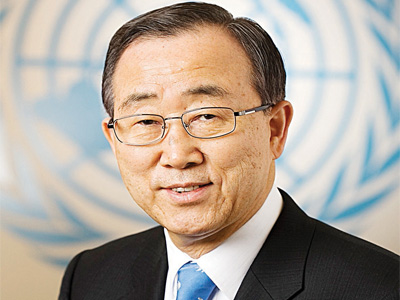
In a UN statement released over the weekend, Ban also noted that there is expectation around the world that with the new government coming to power in Nigeria, there would be a safe return for the abducted Chibok schoolgirls, whose kidnap one year ago has continued to attract global attention.
According to the UN Secretary-General, who spoke at the US National Press Club in Washington DC in Nigeria, our hope is that the new government can promote a return to normalcy and a return for the schoolchildren who have been kidnapped and mistreated during the last one year.”
Ban’s statement over the weekend reflects the generally positive light with which many in the international community continue to perceive Nigeria since after the relatively successful conduct of the Nigerian general elections, which ended last week.
It would be recalled that earlier this year in January, while addressing UN correspondents, Secretary General Ban had described the then forthcoming Nigerian presidential election as a grave test.
Speaking, then, at the UN Headquarters in New York, Ki-Moon without elaborating further, said: “We face another grave test as Nigeria readies for its election next month,” just at the same time that his Special Representative in West Africa, Mohamed Ibn Chambas also explained to the Security Council on the same day that the Nigerian general election is taking place in an increasingly tense pre-electoral environment.
But while speaking in Washington DC at the weekend, Ban also expressed horror regarding the on going terror attacks around the world, including those perpetrated by Boko Haram in Nigeria.
Said he, “we have all been horrified by the terrorist attacks and violence committed by groups such as Da’esh, Al-Shabaab, Boko Haram and others.”
But there is confusion in the United Nations regarding exactly how best the global body should intervene in Nigeria.
While members of the Security Council have drafted a resolution to support the Multi National Joint Task Force, using the UN charter powers for international peace and security based on the UN’s Chapter 7 charter provisions, the Nigerian diplomats in New York had objected to the plan. Backing up that decision publicly for the first time this past week President Goodluck Jonathan said what Nigeria needs is not an international force, but humanitarian assistance.
However, UN diplomats explain that the draft resolution was encouraged by the African group at the UN following up the decision of the African Union to deploy about 8700 African troops to put a stop to the menace and the violence of Boko Haram.
Nigeria’s objection has stalled consideration of the UN Security Council resolution, which would have provided financial and logistics support to the AU force already agreed to by African presidents and heads of state.
That resolution has been tabled informally since March and is still pending.
Further international action on how to fight Boko Haram may be delayed by the United Nations until the resumption of the new Buhari presidency, top UN sources disclose over the weekend. This is so with the ongoing objection from Nigerian diplomats to the draft resolution that has been tabled since last month at the Security Council
The resolution is designed to formally involve the UN to oversee international efforts to fight Boko Haram. But the objection of the Nigerian diplomats at the UN is said to be based on issues affecting Nigeria’s sovereignty, and also its pride considering that Nigeria is currently a member of the UN Security Council.



